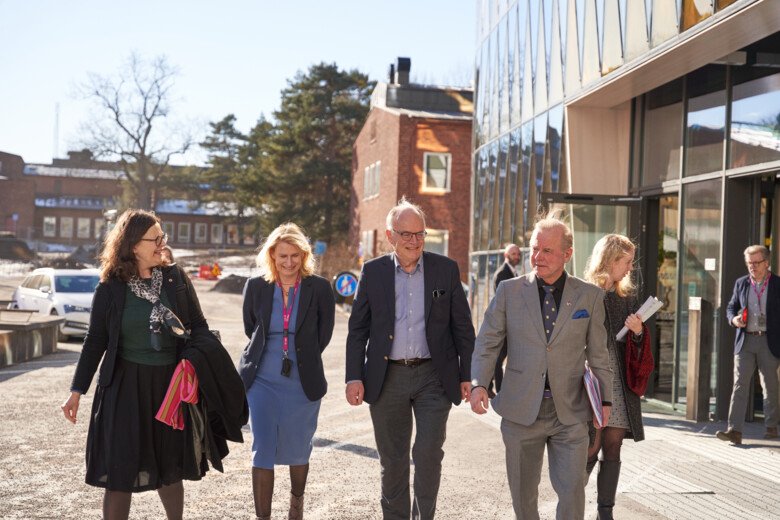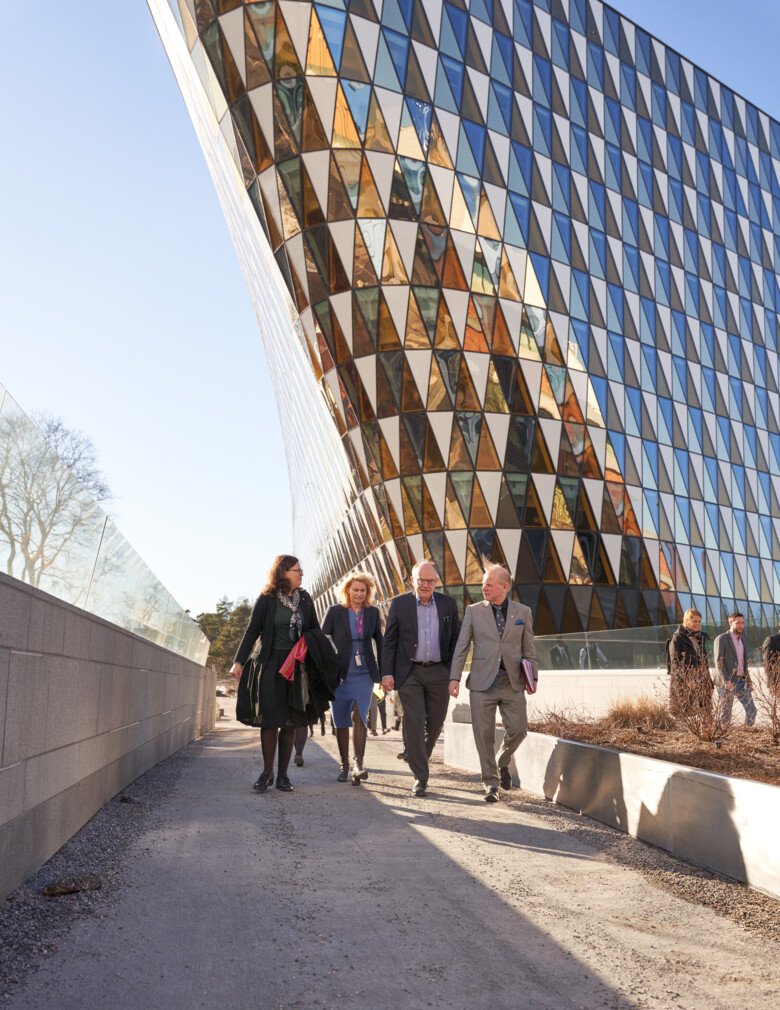Minister for Education Anna Ekström visits Karolinska Institutet

The February sun was glittering in the glazed facades when Karolinska Institutet welcomed Minister for Education Anna Ekström on Monday 28 February. Meanwhile, the situation grew gloomier in Ukraine, which was demonstrated by, amongst other things, a lecture in disaster medicine.
During her visit to KI on her tour of universities, Anna Ekström learned about the work KI is doing in precision medicine, about the link between fat cells and cancer, and about KI’s new Centre for Health Crises. She also met students, researchers and union representatives, as well as the KI management, including the President and academic vice presidents.
Education Minister Anna Ekström arrived at KI by bike in the fine half-term sunshine and was received by KI’s president, Ole Petter Ottersen, in the Aula Medica lobby.
The importance of precision medicine
Even though it was Anna Ekström’s first visit to KI as Minister for Education, it was not the first time she had been here.
“No, I was here back in the 1980s on a visit to the old Medical Students’ Union,” she said.
This time, her visit continued over “Akademiska stråket”, the walkway between the university and Karolinska University Hospital, to Bioclinicum, where researcher and doctor Kleopatra Georgantzi, and professors Anna Martling and Per Kogner, talked about the importance of precision medicine to research on and the treatment of childhood cancer.
Precision medicine has many areas of application and in childhood cancer is a high-class, resource efficient form of care that can reduce severe adverse reactions. Her visit to Bioclinicum also highlighted the importance of the interaction between clinic and science in everything from staff to data.

The new Centre for Health Crises
Back on the other side of Solnavägen in Biomedicum we were met by Dr Kirsty Spalding, whose work on fat cells and cancer is more relevant than ever, now when global obesity is on the rise.
The tour ended back at Aula Medica, where the KI President demonstrated how vital it is to make best use of the ability and competence of academia and science in emergency situations.
“KI made every effort to do everything in our power during the pandemic,” he said. “This included establishing our new Centre for Health Crises. Now, sadly, we have a new crisis on our hands in Ukraine, and we can use the competence and experience that we acquired during the pandemic.”
One example of how the new centre can help is through education, as the Minister discovered when Johan von Schreeb, professor of global disaster medicine, took over.
Disaster medicine studies
Johan von Schreeb stressed the importance of disaster medicine studies, just like the public report on healthcare preparedness presented on 23 February. KI runs programmes on disaster medicine at several levels, and in their teaching Johan von Schreeb and his colleagues often use frisbee-like objects scattered on the floor, each of which represents an injured patient. The task is to then use an established triage system to prioritise patients on the basis of resources and severity of injury, where a “red” is in need of emergency treatment.
Anna Mia Ekström, clinical professor of global infection epidemiology, talked about KI’s work on global public health, which stretches from the micro to the macro level and which serves a capacity-building function for Swedish aid.
Students were then waiting in Aula Medica along with the academic vice presidents for Education and Doctoral Education. The Minister was naturally interested in finding out more about KI’ study programmes, but was particularly keen to talk about our first-cycle education:
“The quality of first-cycle education has been a priority for me since becoming Minister because universities and university colleges prepare students for vital societal roles,” she said.
KI’s programmes account for a substantial proportion of society’s competence supply and provide lifelong learning for healthcare professionals.
The Minister’s visit ended with a private meeting with students and a conversation with the chairperson of the university board and the university management.
